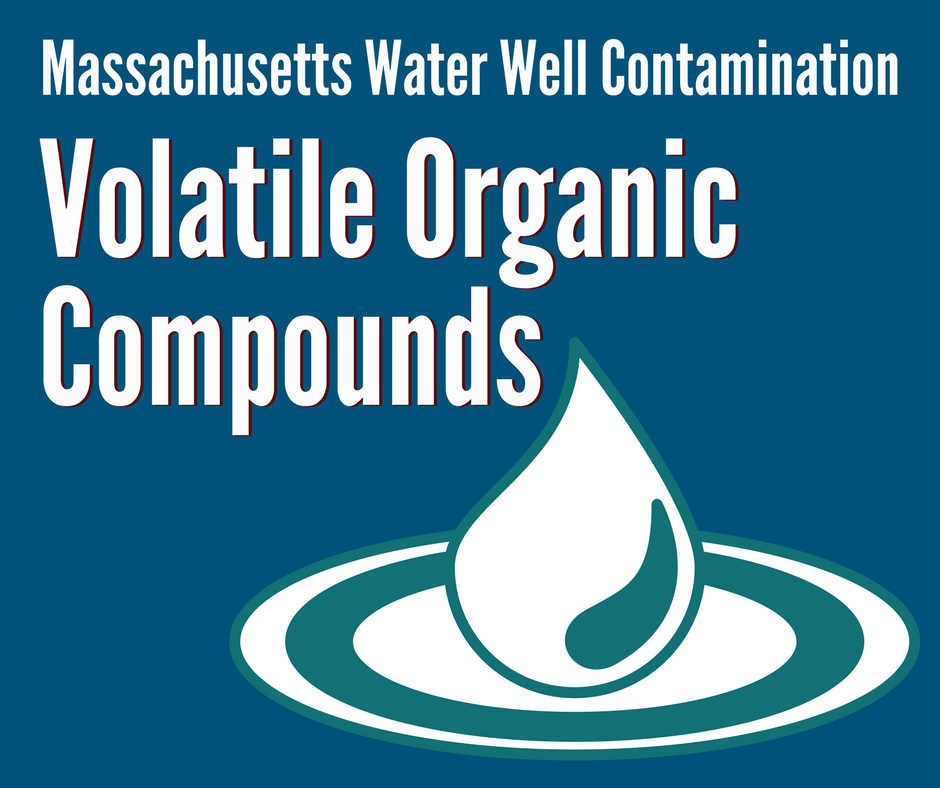Massachusetts Water Well Contamination Volatile Organic Compounds
Volatile Organic Compounds in Massachusetts Water Wells
Today, increasing numbers of homeowners in the Boston metropolitan area are installing private water wells in areas where a public water supply is available. Many are reacting to the increases in MWRA rates, and some are drilling to bypass town or municipal water restrictions during the hot summer months.
Water testing of private wells is the responsibility of the homeowner. One class of contaminants that are not included in standard tests are volatile organic compounds or VOCs. Volatile organic compounds include common, and potentially dangerous pollutants like industrial solvents and gasoline. Most homeowners opt for the standard well test which only looks for bacteria and a few inorganic compounds such as nitrate and sodium. A pass on the standard test does not mean that a well is free of volatile organic compounds. Most volatile organic compounds are not detectable as they are tasteless and odorless in drinking water. Unless you specifically test for volatile organic compounds, you will not know if they are present.
Private Well / Public Water Guidelines
In some metropolitan areas, a residence may be connected to both the municipal water supply, as well as drawing from a private well. If a home is using both public and private water the lines, by law, can not be connected anywhere within the system. If an illegal cross connection is created, private water can be accidentally siphoned into public water mains. Therefore, any residence that is receiving water from both municipal and private sources must be disconnected from the municipal system, or the pipes carrying private, and public water must be completely separate. If you are planning on drilling a well, you must contact your town's Board of Health. If you are currently connected to the municipal water system, you must also contact your local water supplier.
Private water wells are not regulated by either the Federal Government or the Commonwealth. Under current Massachusetts law, local Boards of Health have jurisdiction over private water supplies.
The Massachusetts Department of Environmental Protection has published guidelines to assist local Boards of Health in regulation efforts. The publication discusses the design, construction, testing, maintenance, contamination sources and closure procedures for private wells.
Private Well Ownership
Private wells are completely private. That means the owner does not pay water bills and is not subject to any regulations placed on the public water supply. The homeowner is responsible for water quality. Public water supplies must be tested under the law for bacteria and many chemicals and must meet Federal Safe Drinking Water standards. Beyond any testing that may be required by the local Board of Health, a private well is tested at the owner's discretion. Therefore, many homeowners opt to do the minimal testing to ensure common contaminants are not present.
If a private well tests positive for petroleum or a hazardous VOC, they have some recourse. The MassDEP will try to find the responsible parties. However, it should be noted that finding the source and cleaning up the water supply can take years. In the interim, connection to the public water supply or installing a home water treatment system may be necessary. This option is at the expense of the homeowner.
Well Testing Recommendations: Volatile Organic Compounds
The typical testing most homeowners conduct annually is known as the “sanitary series” or “regular chemical analysis.” This tests the well for bacteria, nitrate, sodium, and several inorganic compounds that may affect the taste, odor or clarity of the water such as water hardness, manganese, and iron. Lead is sometimes included.
The laboratory results will point out any contaminants that may pose a potential health risk or aesthetic issue. Positive results do not necessarily mean that the water is free from other contaminants. Many contaminants require separate testing. The most important regarding health are volatile organic compounds.
VOCs are some of the most common contaminants found in Massachusetts groundwater. They are more easily soluble and mobile in groundwater than many other contaminants like heavy metals or PCBs. VOCs are used in gasoline, fuel oil and industrial solvents and are usually colorless, odorless and tasteless in drinking water, so they are not detectable without specific testing. Depending on the level found, they are potentially dangerous to health.
Many public wells in Eastern Massachusetts, some in pristine areas have had to be shut down after contamination was found. Contamination has also been found in undeveloped towns where there is no apparent threat. In an urban area, there is a greater chance that groundwater is contaminated with VOCs. Improper disposal of these chemicals over the past 40 years has led to widespread groundwater contamination in many areas.
At Skillings and Sons, if you receive your water from a private well, we recommend that our clients annual testing include testing for VOCs. If detected, we can help you with water treatment options to remove VOCs and many other contaminants from your well water with a point-of-entry water treatment and filtration system. If you suspect you may have a problem or would like to arrange testing, give us a call. We're always ready to help!

